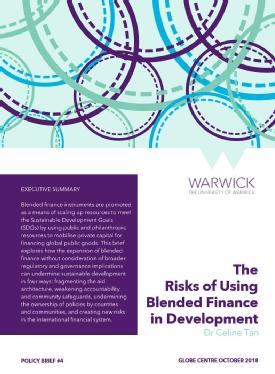Warwick Law School News
Warwick Law School News
The latest updates from our department
Increasing reliance on private finance without adequate safeguards could undermine rather than achieve sustainable development goals, warns Warwick legal expert
The Risks of Using Blended Finance in Development explores the contested role of blending public funds with private finance for investments in sustainable development.
Increasing reliance on private finance for development projects complicates the existing governance and accountability mechanisms for development finance.
Blended finance mechanisms are likely to operate outside regulatory structures established to supervise official and charitable funders, relying on less robust mechanisms of monitoring, evaluation and project accountability.
Communities affected by development projects may have more difficulty bringing claims against both public and private funders under blended finance projects.
The international community must increase its understanding of the legal, financial and regulatory risks associated with the expansion of blended finance
Blended finance should be seen as one of a range of funding options, not the default solution.
The fourth in a new series of briefs bringing current legal thinking to bear on public policy issues has been published by GLOBE, a research centre within the University of Warwick’s Law School.
The Risks of Using Blended Finance in Development, by Dr Celine Tan, Associate Professor at Warwick Law School  (pictured, right), highlights the risks posted by the increasing reliance on new forms of private and innovative finance for funding development projects, calls for action to address the regulatory challenges that blended finance presents, and warns that the use of blended finance should not be intensified without adequate safeguards in place.
(pictured, right), highlights the risks posted by the increasing reliance on new forms of private and innovative finance for funding development projects, calls for action to address the regulatory challenges that blended finance presents, and warns that the use of blended finance should not be intensified without adequate safeguards in place.
Blended finance is an umbrella term for a new approach to development funding, in which public and philanthropic resources are used to incentivise commercial investment in development projects. Their aim is to encourage private investments by reducing risks and improving returns for investors, including through the use of subsidies for loans, grants for technical assistance, or equity investments in development projects.
The growth of blended finance is transforming the international aid landscape, with traditional funders now increasingly playing the role of brokers, and private investors taking a role in policy-making.
Dr Tan’s policy brief highlights four key risks of this change:
- Fragmentation of aid architecture and governance: despite ongoing efforts there is currently no overarching framework governing international development finance. The rapid proliferation of new financing platforms makes it more difficult to achieve a shared monitoring, evaluation and scrutiny framework.
- Expanding the accountability gap: current international legal frameworks governing aid projects are not designed to deal with blended finance platforms. In the absence of a common institutional standard for handling complaints it will be difficult for communities and individuals affected by blended finance projects to seek redress and to hold financiers accountable.
- Undermining country autonomy over development policies: blended finance creates a risk that the projects chosen for funding are those which the commercial investors think will make the best profit, not those which reflect the needs of the host country or the Sustainable Development Goals. Host countries are often asked to reform their legal and regulatory regimes to accommodate the needs of foreign private investors in a way which may not be in their best interests.
- Creating new financial risks: financial markets solutions may not be sufficiently reliable as an international response to the challenge of financing sustainable development. Relying on new financial instruments risks the financial stability of countries receiving the aid, including the build-up of unsustainable debt.
Dr Tan said:
 “Blended finance is now a key catchphrase in international development cooperation. Proponents argue that these deals are crucial to scaling up resources for meeting the ambitious global Sustainable Development Goals (SDGs). However, these forms of public-private financing carry significant risks for developing countries and communities compared to more mainstream forms of development finance.
“Blended finance is now a key catchphrase in international development cooperation. Proponents argue that these deals are crucial to scaling up resources for meeting the ambitious global Sustainable Development Goals (SDGs). However, these forms of public-private financing carry significant risks for developing countries and communities compared to more mainstream forms of development finance.
“The international community, including recipient governments, donors, financial institutions, private investors and civil society, must ensure that the decision whether to deploy blended finance in any development scenario is accompanied by robust accountability and regulatory safeguards and is consistent with internationally agreed standards of development cooperation, including commitments to country ownership and transparency in financial governance.”
Dr Andreas Kokkinis, Assistant Professor at Warwick Law School and editor of the briefing series, said: ‘‘We are excited to be launching the first policy brief of the new academic year and fourth of our series.
“Dr Tan’s brief explores the topical and controversial issue of blended finance as a tool to achieve Sustainable Development Goals. Her analysis highlights weaknesses in the current system in terms of accountability, transparency and recipient country ownership.
“As such, the brief adds to the ongoing policy debates surrounding sustainable development, foreign aid, the relationship between the global North and the global South and the contested role of private investment in infrastructure development
- The aim of the GLOBE policy brief series is to improve the factual base on which policy decisions are made and share cutting-edge academic research in an accessible and relevant manner with policymakers, the media, civil society groups and the general public.
- GLOBE intends to publish around four papers a year on topical issues. Previous papers in the series explored the regulatory impact of the UK’s withdrawal from the European Union on the UK’s financial services sector, and the consequences of Brexit for intellectual property laws and policies, and the UK’s ability to influence European and international norms in this field.
- The policy briefs are each available online. There will also be a limited print run of each policy brief in the series.
Dr Celine Tan is Associate Professor of Law at Warwick University’s School of Law. She is also the Director of the Centre for Law, Regulation and Governance of the Global Economy (GLOBE) based at Warwick Law School.
She joined Warwick Law School in September 2011 from the University of Birmingham where she was Lecturer in Law from 2008 - 2011. She completed her PhD at the University of Warwick where she held a Postgraduate Research Fellowship from 2002 - 2005. Prior to Birmingham, Celine taught law at Warwick and was also a consultant researcher with the Third World Network, a research and advocacy organisation based in Malaysia and Switzerland.
She has worked with international organisations and other non-governmental organisations (NGOs) in Europe, Africa and Asia on issues relating to social and economic development and human rights. Her research centres on exploring aspects of international economic law and regulation with a focus on international development financing law, policy and governance. She is also interested in the intersections between law and development, gender, human rights and the environment. Celine has published on issues relating to the law and governance of the international financial architecture, sovereign debt, climate change and sustainable development, the role of international financial institutions and human rights.
The Centre for Law, Regulation and Governance of the Global Economy (GLOBE) at Warwick Law School, created in 2014, is a research and public engagement centre that brings together staff and postgraduate students working in international economic law, business and commercial law, corporate governance and financial regulation.
